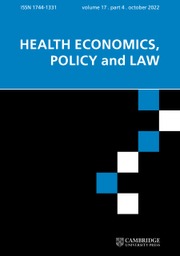Article contents
Acquisition and disclosure of genetic information under alternative policy regimes: an economic analysis
Published online by Cambridge University Press: 02 June 2006
Abstract
A current policy issue is whether, and if so under what circumstances, insurance companies should be given access to genetic test results. The insurance industry argues for mandatory disclosure in order to avoid problems of adverse selection; an alternative would be a moratorium or legislation preventing such disclosure; a third option a voluntary disclosure law. This paper investigates the impact of these policies on individuals' incentives to both acquire genetic information and to disclose it to providers of health and/or life insurance. The theoretical framework used to inform this analysis is provided by the ‘games of persuasion’ literature, in which one agent tries to influence another agent's decision by selectively withholding her private information regarding quality. The application of the theoretical framework to this policy context yields the following results. Individuals have the incentive to acquire genetic information and to disclose the test results if disclosure is voluntary. If, however, they are obliged to disclose the results of any genetic tests they have taken, their incentive may be not to acquire such information. I discuss the policy implications of these findings both from the point of view of the insurance industry and from a public health perspective.
- Type
- Article
- Information
- Copyright
- © Cambridge University Press 2006
- 2
- Cited by




